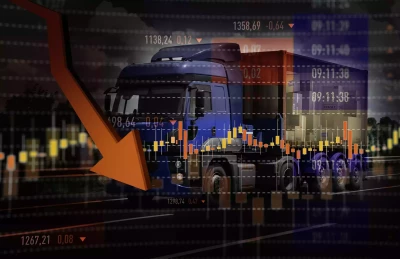Surviving the transport recession
August 23, 2023
 In recent months, even the most conservative economic forecasts included a strong chance for a mild recession by the end of 2023. Today, it’s beginning to look like recession may be entirely avoidable.
In recent months, even the most conservative economic forecasts included a strong chance for a mild recession by the end of 2023. Today, it’s beginning to look like recession may be entirely avoidable.
“No economic recession yet, and I don’t even know that we’re going to get one,” says Bob Costello, Chief Economist at the American Trucking Associations. “It’s very strange, and I think part of it is the very aggressive Federal Reserve.”
For over a year, the Fed has been raising interest rates in an effort to tamp down runaway inflation. These efforts seem to be having their intended effect on the economy at large. Though recession may be less likely in the big picture, the freight industry does not share the same sunny outlook. In fact, this isolated segment of the economy has already been in a recession for months.
Costello points to a shift from a goods-based consumer market during the pandemic to today’s experience/service-based spending model to explain the downturn in trucking. Add in lower housing and industrial production as well as lingering inventories and you have the recipe for a freight recession.
The freight economy is in a recession. Is there any hope for struggling carriers? Watch the latest episode of the Stay In Your Lane Podcast for valuable economic insights.
In many ways, freight leads the economy—at least in terms of physical goods—when it comes to both recession and recovery. “We are a good reflection of the physical goods economy,” Costello says of the freight industry. “This is a prime example of [what happens] when you see a divergence between the goods economy and the services economy. We as an industry are underperforming the macroeconomy.”
While Costello no longer forecasts a recession is in store for the macroeconomy, he sees a clear culprit for the recessionary trend in freight. “It’s not so much because of the demand cycle in the industry. It’s what’s going on with supply,” he explains. “To me, that is the big story in the trucking industry right now.”
Small fleets were struggling at the end of 2022 and into the beginning of this year, with many operations going out of business. Now, these fleets and independent operators are in a precarious financial position thanks to high equipment costs and other mitigating factors. Many more are closing shop or choosing to join larger companies on an employee basis. All of this combines for the reduced freight supply that Costello highlights.
Major cost pressures point to further troubles for small fleets and independent owner operators going forward. Fuel prices continue to rise. Meanwhile, the bottom has fallen out of the spot market, where many small operators do most of their business. These trends further highlight a reduction in freight capacity.
But all is not doom and gloom. Costello believes that conditions are right for a spot market comeback in the near future. “All we really need is for demand to level off and maybe even come up just a hair, and it’s going to feel different for fleets out there,” he explains.
A better spot market would offer relief to many small operations that are struggling. But even larger transport companies are not immune to the effects of a sluggish transport economy, as the sudden and dramatic closure of Yellow Corporation shows. Along with outright closures, some larger carriers are being acquired by their competitors. This is all symptomatic of the shrinking capacity that Costello is tracking across the industry.
“Let’s say the number of loads normally goes up two percent a year. If we even get to one percent growth, the fleets that are still around would notice it and start to feel better,” Costello says. “Again, it is a supply side story.”
Even a small uptick in demand could be a light at the end of the tunnel for carriers who can survive these trying times. For a transport partner who can help you weather the ups and downs of the economy, trust the 3PL professionals at Triple T Transport. Contact us today to learn more about our wide range of services.












